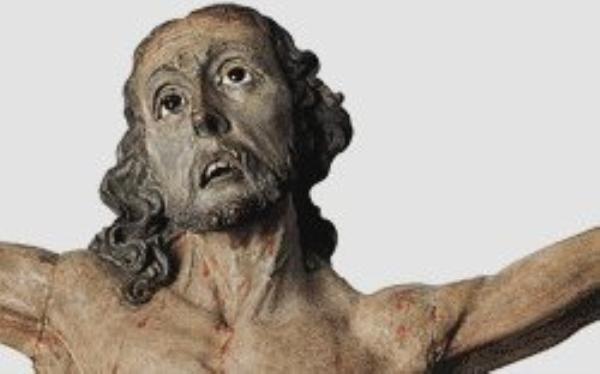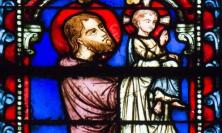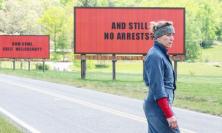The small Bavarian village of Oberammergau has once again been packed with visitors all summer, coming to see the famous Passion Play, which concludes this week. Performed every ten years since the seventeenth century, the play still includes much of the original script and music, but this year includes much that is new. Peter Scally SJ attended a performance and spoke afterwards to Otto Huber, the play’s Director of Drama.
Congratulations on this magnificent work you do! I wanted to ask you, how do you manage, in a village of five thousand people, to put on a play like this with, what, fifty in the choir, a hundred and something in the orchestra, and hundreds in the cast?
I think that it’s really amazing what we are. I am very proud of our village: we have a village of five thousand inhabitants with our own symphony orchestra of our own people, and some choirs and so on, and also church music is done well here in Oberammergau and there is a lot of musical education. Every year we have some theatre performances here and there are several theatre groups, and we have done this for hundreds of years. And I think Bavaria is a special region – first of all it was the Catholic region of Germany, and I think in Catholicism there is maybe a tradition of accepting our body, our senses, or whatever. So, theatre was much more widely spread in the south of Germany, they like theatre and they like music very much. By the way, in Bavaria we say ‘Musik’, and in northern Germany they say ‘Musik’. Why? Because for a long time we were inspired by the Latin version, la musica, so we say Musik as it is in Latin. And we have a special confessional background. And I think it’s also something like in Great Britain, where you find wonderful meadows before a castle that have been worked on for hundreds of years – we have worked for hundreds of years on our musical and theatrical capacity.
So, I wonder, because so many people in the village are involved – I mean it must be at least half the village...
About fifty percent, yes.
...does that affect their daily life outside of the play? Does it mean they have a livelier faith? Do you think it affects their understanding of their faith and their life in general? Does it ‘flow through’?
Well, my grandfather’s family was always very committed to the play – he played Caiaphas three times, and Caiaphas is not a friend of Jesus but before every play he went to Holy Mass. My family was 150% Catholic and so I was educated near to Oberammergau by the Benedictine monks. In Oberammergau, and in the whole region, you can feel that we were once what they called the ‘corner of the monks’ – we had so many monasteries here. And in Oberammergau especially there was the influence of the Augustinians, and in every church you see again and again the symbol of the burning heart – I think it’s an erotic version of the Catholic belief somehow, but it means also that it’s more important to have a good heart than to have a good brain, maybe. So there is a certain cultural background to the theatre. And you know it’s a very good approach if you don’t understand – the Bible is really not always easy to understand – and there was a friend of Freud, Dr Moreno, who said sometimes it is better to understand things by acting them out, or let’s say by doing, by following in the footsteps of Jesus. Then you can understand a little bit, and it’s a little bit like what the Exercises of your Jesuit father, Ignatius, tell you: you have to imagine what’s going on. So, when Jesus has the Last Supper, ‘where are you sitting? Look at him...’ And when we are doing the rehearsals, we discuss and discuss and discuss and discuss! So we really enter into the situation. I think Ignatius would be happy if he saw us here.
Now, you’re not only the deputy director, you also wrote a lot of this play.
I wrote a lot, especially the words of the prologue – it’s interesting that the prologue and also the choir, again and again, have the perspective of the believers in the play. Sometimes they show historical facts somehow, too, and it’s just me who wrote most of the texts for the choir and for the arias and for the prologue, too. But [the director] Mr Stückl and me, we wrote the dialogues together. And we brought in new things. For example, in the gospels – I don’t know why – Pilate is shown rather as a gentle man, and if you look at the historical testimonies he looks more cruel. And I think sometimes we not only show a historical play but we show our historical experience, too. When you look at Stalin and all those dictators from Hungary and the Czech Republic, but especially Mr Hitler in Germany, again and again there is no understanding in Communism or nationalism for a religious relationship with God. So I think it was good that this time we had a cruel Pilate who talks with a lot of [contempt] about Jesus and the Jews and he says ‘to blame you I will give you this funny, damned king to your funny, damned nation!’ – so I think there is a very contemptuous background.
And the other character who I thought was very interesting was the way that you portrayed Judas. There was much more of an attempt to understand what was happening in Judas’s mind.
Yes. I think I am somebody who, in my life, has been in a situation in which I have betrayed somebody – maybe not betrayed, but something near to this – and I think you never give up a friend only for a few Euro or silver sterling, especially as the pound now is perhaps not the best pound ever! So I think there must have been a different background to all the despair of Judas. And maybe I should say that there is a special background to the Passion Plays: our Passion Play is 400 years old and one of the main ideas of the Passion Play in 1750 was höret, sehet, weihet und liebet – ‘listen, look, weep and love’. The logic was that Jesus did something unbelievable because he loves us, and when we have the experience of this great love we cannot do otherwise than love from our heart, to love him from the bottom of our heart. And so again and again the experience of the Passion Play was to prepare people a little bit to go to confess their sins and to change their lives. That means, they came, they saw the great love and they tried to get away from the sinner’s life to a life of love, too. And so there was always this comparison with Peter – Peter who was really a weak person sometimes, who said, ‘I don’t know this guy’ – and in the Passion Play we now make this even more dramatic because he can look at Jesus in the moment of the flagellation, he can see him. And in spite of this experience he says, ‘I don’t know him’ – that’s really awful, awful. And so afterwards he is in great despair too, but then he changes and he gets out of this despair and he gets a new sense of confidence in God and Jesus.
In the programme notes it explains that the difference between Judas and Peter is that Peter believes in the possibility of forgiveness.
Yes, that’s it. Peter believes in the possibility of forgiveness and we worked it out in a strong way, I think. Peter believes – and he is a bad guy, Peter, maybe not someone you’d want to go on holiday with! But I think there is less culpability in Judas. He says things should go a different way – ‘we should get rid of the Romans to be able to live our religious life’, and so on. There is a serious doubt in Jesus, and why shouldn’t you have doubts in Jesus? And I think it’s our situation, too. We, in our lives, have doubts and doubts and more doubts. I have a few friends who have turned to suicide. So we show [Judas] with a lot of mercy, I think, and there are also songs afterwards filled with mercy, and asking God to forgive those who, in suicide, died in despair.
Also, what I really liked about the play was the way that the characters were not one-dimensional. There was a depth to them. Even amongst the Council, the Sanhedrin, for instance, you see the arguments, the different views....
If you look at the films about Jesus, there is one by Rosellini which shows him, at the end, really isolated; nobody takes care of him and he is out of the town, out of the city, out of society and he dies alone. And the Passion Play was done the same way in the nineteenth century. At the beginning there is a moment where they all cry ‘hosanna’, and then they run away and the next moment everybody is against him. Maybe this was a reflection of the experiences of crowds in the nineteenth century, you know, it was always dangerous in Paris and elsewhere. And in the twentieth century we had this situation in the play – nobody was with Jesus and all the Jews were against him – so in 1935, Hitler came to Oberammergau and said, ‘Oh, this Oberammergau play is a lecture in our racist values – you can see this wonderful, Roman philosopher Pilate who asks, “what is truth?” and those hateful, Jewish, destructive crowds!’, and this is not what we want to say! And in the meantime we have also brought into the group of the priests and the Pharisees and the scholars a lot of discussion, and the main question is: ‘Who is Jesus? Is he worth following or not?’ And this is a [current] question, too. There is – up until the crucifixion – always a struggle. There are some who like him, like Nicodemus, Joseph of Arimathea; there is noble Gamaliel who was the teacher of Paul, and the Acts tell us that he was a very noble person. So there are all kinds of scholars and all kinds of questions in the High Council. And I think one of the most important things is that we have now brought much more of the Sermon on the Mount into the first act, and we have brought the moment where [Jesus] throws the merchants out of the Temple into the third act, and when it is finished – this prophetic act to say ‘focus on God’ – when this is done and the merchants are gone, in 2000 and in 1990 we brought in a pilgrim psalm from the Book of Psalms, but now we’ve changed it in an interesting way. When they are gone, all the people around the Temple are praying together the Sh’ma Israel, one of the central prayers of Israel, with the sense that there is one God for us and let’s love him from the bottom of our heart. And this is really fantastic. I think twenty years ago, thirty years ago, it would have been difficult if, in the play, we put the name ‘Rabbi’ – teacher – on the lips of some of the disciples. We did that in 1990 and 2000, but even then it would have been impossible to have five hundred people on the stage, five hundred actors, singing a Hebrew prayer. But that’s happening now, and I think it’s an important step.
Yes, it was for me one of the most moving parts of the play when they were singing that. Finally, can I ask you: in a Europe where people say religion is in decline, there’s no sign of decline here – it’s getting stronger, it’s getting bigger, the commitment is greater. What is the secret of Oberammergau that makes people’s fervour so strong?
Do you know, there is a real danger in theology – there are some theologians who look only at the kerygma, at the ideas of Jesus, and these theologians say there was never a person with the name Jesus, it’s a myth, the whole thing. Then you have some people who look only at the historical Jesus and they forget the Christ in heaven, the one to whom you pray, as if it is only a historical detail of two thousand years ago. And I think in Oberammergau it’s quite interesting that we try to balance the historical experience with a wonderful man in a dramatic situation and bringing some messages, some challenging messages. And that’s one part of it. But I think there is also this rhythm of meditation with the music, and the music is very touching. I think of it as comparing reading a history book about Churchill – you can read ‘Born:’ and ‘School:’ and ‘University:’, and so on – with receiving a love letter and maybe a photograph of your girlfriend, boyfriend or whatever; then you can read a sentence over and over again, and you look at their smile and their eyes and so on. And so, during this time – I think it’s very much like in Ignatius – in this time you get into a relationship with the one you are looking at. And I think the music and the Passion Play in Oberammergau really has this balance of meditation and drama, meditation and drama, meditation and drama. And there are some historians who are there because they want to look at it as a historical play – but suddenly they weep because the music makes them weep.
Otto Huber is Director of Drama for the 2010 performance of the Oberammergau Passion Play. Peter Scally SJ is Editor of Thinking Faith.
Hear Peter Scally SJ’s interview with Otto Huber
![]() Oberammergau Passion Play 2010
Oberammergau Passion Play 2010






